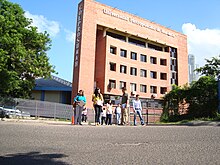You can help expand this article with text translated from the corresponding article in Spanish. (June 2015) Click [show] for important translation instructions.
|

Education in Honduras is essential to the country of Honduras, for the maintenance, cultivation, and spread of culture and its benefits in Honduran society without discriminating against any particular group. The national education is secular and founded on the essential principles of democracy, inculcating and fomenting strong nationalist sentiments in the students and tying them directly to the economic and social development of the nation.[1] Honduras's 1982 Constitution guarantees the right to education, a right also conveyed through the National Constituent Assembly's Decree 131 and in the official daily publication La Gaceta.
The government has the obligation to develop and provide basic education to its people, and does so by creating administrative and technical organizations answerable directly to the Secretary of State in the Ministry of Public Education.[2] The eradication of illiteracy is currently the primary task of the government, making it the responsibility of all Hondurans to help achieve this goal as well.[3] The government also protects the related rights to research, learn, and teach.[4]
The Human Rights Measurement Initiative (HRMI)[5] finds that Honduras is fulfilling only 58.7% of what it should be fulfilling for the right to education based on the country's level of income.[6] HRMI breaks down the right to education by looking at the rights to both primary education and secondary education. While taking into consideration Honduras' income level, the nation is achieving 69.0% of what should be possible based on its resources (income) for primary education but only 48.4% for secondary education.[7]
- ^ Capítulo VII, artículo 151, de la Constitución de la república de Honduras de 1982
- ^ Título VII, Artículo 153, de la Constitución de la república de Honduras de 1982
- ^ Título VII, Artículo 154, de la Constitución de la república de Honduras de 1982
- ^ Título VII, Artículo 155, de la Constitución de la república de Honduras de 1982
- ^ "Human Rights Measurement Initiative – The first global initiative to track the human rights performance of countries". humanrightsmeasurement.org. Retrieved 2022-03-18.
- ^ "Honduras - HRMI Rights Tracker". rightstracker.org. Retrieved 2022-03-18.
- ^ "Honduras - HRMI Rights Tracker". rightstracker.org. Retrieved 2022-03-18.